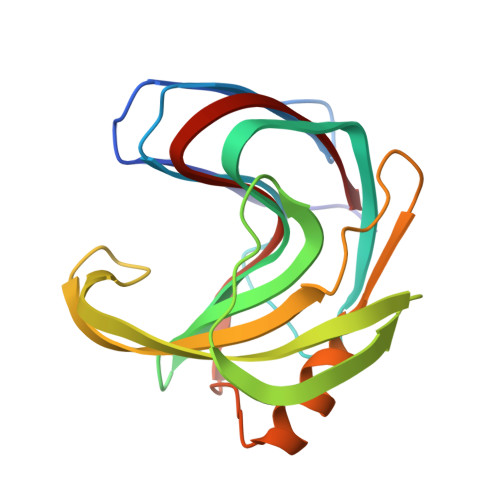Strategies for modulating the pH-dependent activity of a family 11 glycoside hydrolase
Ludwiczek, M.L., D'Angelo, I., Yalloway, G.N., Brockerman, J.A., Okon, M., Nielsen, J.E., Strynadka, N.C., Withers, S.G., McIntosh, L.P.(2013) Biochemistry 52: 3138-3156
- PubMed: 23578322
- DOI: https://doi.org/10.1021/bi400034m
- Primary Citation of Related Structures:
3VZJ, 3VZK, 3VZL, 3VZM, 3VZN, 3VZO - PubMed Abstract:
The pH-dependent activity of wild-type Bacillus circulans xylanase (BcX) is set by the pK(a) values of its nucleophile Glu78 and general acid/base Glu172. Herein, we examined several strategies to manipulate these pK(a) values and thereby shift the pH(opt) at which BcX is optimally active. Altering the global charge of BcX through random succinylation had no significant effect. Mutation of residues near or within the active site of BcX, but not directly contacting the catalytic carboxyls, either had little effect or reduced its pH(opt), primarily by lowering the apparent pK(a) value of Glu78. However, mutations causing the largest pK(a) changes also impaired activity. Although not found as a general acid/base in naturally occurring xylanases, substitution of Glu172 with a His lowered the pH(opt) of BcX from 5.6 to 4.7 while retaining 8% activity toward a xylobioside substrate. Mutation of Asn35, which contacts Glu172, to either His or Glu also led to a reduction in pH(opt) by ~1.2 units. Detailed pK(a) measurements by NMR spectroscopy revealed that, despite the opposite charges of the introduced residues, both the N35H and N35E forms of BcX utilize a reverse protonation mechanism. In this mechanism, the pK(a) value of the general acid is lower than that of the nucleophile, and only a small population of enzyme is in a catalytically competent ionization state. However, overall activity is maintained due to the increased strength of the general acid. This study illustrates several routes for altering the pH-dependent properties of xylanases, while also providing valuable insights into complex protein electrostatics.
Organizational Affiliation:
Department of Biochemistry and Molecular Biology, University of British Columbia, Vancouver, British Columbia, Canada V6T 1Z3.















